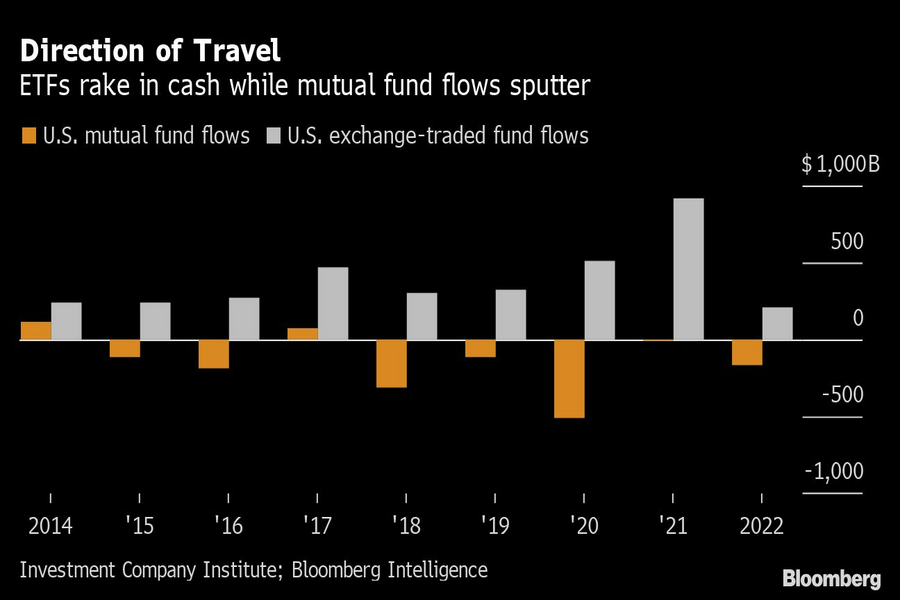

JPMorgan Asset Management will convert a $1.1 billion fixed-income mutual fund into an ETF on Friday, joining a growing Wall Street trend that’s expected to see as much as $1 trillion make the switch.
The JPMorgan Inflation Managed Bond Fund (JIMAX) is becoming the JPMorgan Inflation Managed Bond ETF (JCPI) after the close, according to a notice on the fund’s website. It’s the first of four planned conversions by the firm that will shift around $9 billion of assets into exchange-traded funds by mid-June.
Just a year after the first formal conversion between the two investment structures took place, multiple issuers have now made the move as investors increasingly favor typically lower-cost, more tax-efficient ETFs.
More than $160 billion has exited mutual funds in 2022 so far as ETFs have absorbed over $200 billion, Investment Company Institute data show.

“Conversions in general are going to continue to accelerate, they’re proving to be an interesting avenue for entrants,” said Jill DelSignore, managing director at FLX Networks. “Coming to the market with a track record and assets is incredibly important.”
Bloomberg Intelligence estimates that as much as $1 trillion could ultimately be converted to ETFs from mutual funds.
While that would be a huge boost to the $7 trillion U.S. ETF market, it’s around 5% of the mutual fund world. The challenge for most funds is that switching is complex and not suitable for every product. Meanwhile, the American pension system remains heavily geared toward the more established vehicle.
The biggest conversions so far are from quant giant Dimensional Fund Advisors, which flipped around $29 billion in June last year. Others switchers have included Motley Fool Asset Management, which finalized a nearly $1 billion move in December. Franklin Templeton has plans to join the conversion club later in 2022.
As more of them make the switch, asset managers will face some “potentially eye-opening” moments if the strategies fail to attract more cash, reckons DelSignore.
“The ETF wrapper is an amazing one, but it’s not magic,” she said.
The expense ratio of JCPI will be 0.25%, cheaper than fees on the various share classes of the mutual fund. The conversion will expand JPMorgan’s stable of U.S. ETFs to 41, according to data compiled by Bloomberg.

By listening for what truly matters and where clients want to make a difference, advisors can avoid politics and help build more personal strategies.

JPMorgan and RBC have also welcomed ex-UBS advisors in Texas, while Steward Partners and SpirePoint make new additions in the Sun Belt.

Counsel representing Lisa Cook argued the president's pattern of publicly blasting the Fed calls the foundation for her firing into question.

The two firms violated the Advisers Act and Reg BI by making misleading statements and failing to disclose conflicts to retail and retirement plan investors, according to the regulator.

Elsewhere, two breakaway teams from Morgan Stanley and Merrill unite to form a $2 billion RIA, while a Texas-based independent merges with a Bay Area advisory practice.
Orion's Tom Wilson on delivering coordinated, high-touch service in a world where returns alone no longer set you apart.
Barely a decade old, registered index-linked annuities have quickly surged in popularity, thanks to their unique blend of protection and growth potential—an appealing option for investors looking to chart a steadier course through today's choppy market waters, says Myles Lambert, Brighthouse Financial.
